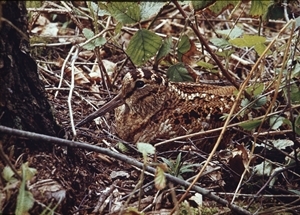 The woodcock is one of our most secretive bird species and up until now much of its fascinating ecology has eluded wildlife enthusiasts and researchers.
The woodcock is one of our most secretive bird species and up until now much of its fascinating ecology has eluded wildlife enthusiasts and researchers.
However, with the help of satellite tracking technology, the painstaking research being carried out by the Game & Wildlife Conservation Trust (GWCT) is finally starting to unravel the mysteries surrounding this enigmatic wader bird.
To find out more about this unique research, Dr Andrew Hoodless, a leading expert on woodcock, will be revealing the results of some of this pioneering research at a special evening talk being held at the RAF Club in Piccadilly, London on Tuesday 25th March starting with drinks at 6.15 pm.
Already the satellite tracking research has revealed that, despite its diminutive size, migrating woodcock can fly for 18 to 24 hours non-stop while covering distances of more than 1000 km (625 miles) in that time. Like Olympic champions, some of our woodcock wintering with us in Britain originate from breeding grounds as far as central Siberia, some 7,000 km (4,380) miles away.
In the past few years 24 woodcock from different locations in the UK have had satellite transmitters attached to them in order to record their long flights back to their breeding grounds. Bird watchers and sportsmen alike, who are sponsoring individual birds, can watch the progress of these birds as these breath-taking flights are recorded in ‘real time’ on the dedicated website at www.woodcockwatch.com.
Renowned wildlife artist Owen Williams will be complementing Andrew’s fascinating talk on woodcock at the RAF Club and will explain how he has become an avid enthusiast and is now involved in this important research by ringing birds in various sites in Wales.
Owen explains, “I have been catching woodcock for more than 5 years and during this time have caught over 1,000 woodcock. This research is vital to ensure that woodcock have a more sustainable future. My talk will outline this exciting work and will explore some of the ground-breaking data that has been revealed through the Woodcock Ringing Network as well as the satellite tracking project being run by the GWCT. There are indications that weather might have an impact on aspects such as spring departure dates.”
Tickets for this fascinating evening talk and auction, which aims to raise funds for woodcock research are £30 to include a drinks reception.
Or contact Tortie Hoare on 0207 637 3826 or email: thoare@gwct.org.uk.
END
Photocaption: The woodcock is one of the UK's most elusive and secretive birds.
Notes to editors
The Game & Wildlife Conservation Trust – providing research-led conservation for a thriving countryside. The GWCT is an independent wildlife conservation charity which has carried out scientific research into Britain’s game and wildlife since the 1930s. We advise farmers and landowners on improving wildlife habitats. We employ more than 60 post-doctoral scientists and other research staff with expertise in areas such as birds, insects, mammals, farming, fish and statistics. We undertake our own research as well as projects funded by contract and grant-aid from government and private bodies.
For information, contact:
Eleanor Williams
Telephone: 07592 025476
Email: press@gwct.org.uk